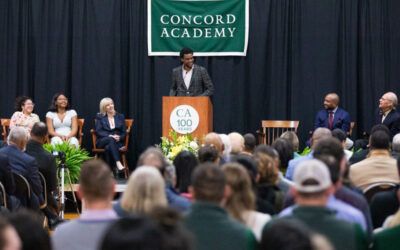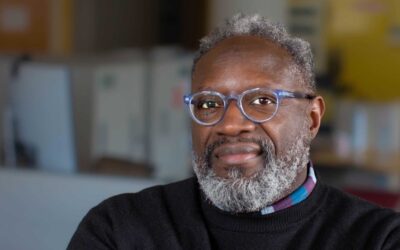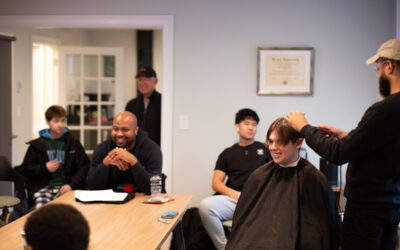“That’s Just What You Are” (Written and performed by Aimee Mann)
“More Than This” (Written by Bryan Ferry; performed by Lucy Kaplansky)
Good morning everyone — and welcome to the true start of school. I know we officially kicked off the year yesterday, but between shortened classes and the adrenaline coursing through everyone, it’s a wonder we managed to get safely from place to place, let alone absorb anything. Today will roll out as most of our days here will — predictably, deliberately, and, we hope, happily. In the days ahead, each of you will, I hope, find a comfortable routine, a manageable balance of work and play and rest. Every day should have a measure of each, after all.
I have been ruminating about this chapel talk for some time, though it’s also true that the bulk of it was composed over the last four days. I like to ruminate a long time and then compose pieces of writing in concentrated bursts. I have never been very good at starting right off putting pen to paper — or fingers to keyboard; I have tried it, and the most I ever got was a few amusing fragments that, try as I might, I could never tease into anything whole or sustained. I recall a teacher I had many years ago; he was very well-meaning and thoughtful, and his advice made complete sense to me: Plan out what you want to say; develop a detailed outline; write a complete draft; get feedback, and then revise accordingly. However, try as I may, I could never do steps 1 through 3. So for me it’s rumination, intense composition, feedback, and then revision. I want to put in a special plug for the feedback part. Anyone can tell you that I seek and use feedback on everything I write; having the benefit of someone else’s eyes and sensibilities is always wise, and I know your teachers will emphasize this practice in their classes.
Listen carefully to your teachers. Listen to their advice, and emulate their skill and understanding. Then, and this is the important part, make your own sense of what they have taught you. Learning is always more than imitation; learning means questioning, internalizing, and then understanding what works best for you. This is part of what we mean when we say that everyone at CA is different, because no two students learn exactly the same way. Each of you needs to learn how you learn, how you understand, how you work best. Your teachers and classmates will support you in this effort, but your central task here at CA is to take ownership of your own learning.
I first began ruminating about this chapel talk while reading Stony the road: Reconstruction, White Supremacy, and the Rise of Jim Crow, by Professor Henry Louis Gates Jr. In the wake of the Civil War, Gates notes, the federal government embarked on a policy of Reconstruction, whose aim in part was to build a more just and equitable society in the United States. However, soon enough the glow of such idealism had dimmed amidst the sustained and systematic rolling back of those very policies on the state level. Gates draws a parallel to what we observed following the election of the country’s first African-American President, Barack Obama, in 2008 — a period of euphoria about the progress the country had made followed by a violent backlash from those seemingly threatened by such progress.
Then, over a period of about four weeks in late July and early August, every day seemed to bring a new horror: episodes of violence at festivals in Brooklyn, N.Y., and Gilroy, Calif.; a suicide bombing at a wedding in Afghanistan; an attack on a funeral in Nigeria; shootings in Dayton, Ohio, and El Paso, Texas; the vandalism and violence in Hong Kong; an airstrike on a Libyan migrant camp; and many other disturbing instances of needless inhumanity.
What do we say or do about such instances of cruelty and pain and loss? What do we say or do in the face of injustice? Of racial discrimination? Of gender discrimination? Of discrimination because of one’s sexual orientation? Should we turn away? Should we throw up our hands and say, there’s nothing to be done? It’s easy to do these things. Easy to say it’s broken and beyond fixing.
In this moment, we may feel that we have no role in addressing such systemic wrongs. But I believe we do. I believe that all of us have a role, and that this role is to do what we can, here, in the community in which we live, this place whose inhabitants come from so far and so wide. Together, I say, let us strive to live according to our mission. By doing so, we will not only contribute to this community, but we will also develop the skills and attitudes that will enable us to contribute to the world beyond this community.
As most of you know, our mission statement was revised last spring. I would like to reflect on it, stanza by stanza. The first reads:
We are a community animated by love of learning,
diverse and striving for equity,
with common trust as our foundation.
What does it mean to “love learning”? I think it means to be curious, to be eager to confront those moments when we must admit, “I don’t know.” To love learning is to love the question, the journey, more than the answer or the destination.
The second line asserts that, while we are a diverse community, we must strive to be an equitable community; it is work to which we must all contribute. This is not up to some to opt in or out, but an effort that depends upon us to bring our full selves. Just as we must wash and care for our physical bodies every day, so too must we attend to attitudes and actions, and be willing to admit when and where we may fall short in order to progress.
And what do we mean by common trust? To see that we are not alone in this community, that being responsible for ourselves and being aware of the effect of our actions and attitudes on others are two parts of a single promise: that we will do our best to make this community a home for everyone. That value lies at the heart of our community. It is our core, our central shared commitment.
Honoring each individual, we challenge and expand
our understanding of ourselves and the world
through purposeful collaboration and creative engagement.
In the second section, I think of “honoring each individual” as “seeing” a person for who they are, and for what they bring that is unique; thus, “honoring” another means accepting that person as different from me or anyone else; and then celebrating that person’s presence. To “challenge and expand our understanding” is to examine our attitudes and actions, to see ourselves and others with an open mind, open to growing and changing. And then, to collaborate, learn with and from one another, by being present and by having intention. And finally, to engage creatively, that is, not simply following the ways things have been done, but to be open to new ways of thinking and doing.
We cultivate empathy, integrity, and responsibility
to build a more just and sustainable future.
In doing all this, we cultivate as a gardener cultivates growing — with daily effort, turning over the soil to make it breathe, caring for each plant so that it will thrive; we do this for one another. What results from our efforts is empathy — the ability to feel what another person feels, and thereby, to care about the wellbeing of others; integrity — the sense of being whole, of being safe and confident to act as a complete person; and responsibility — to accept the weight of our attitudes and actions on ourselves and others.
If we strive to do these things, we will, as individuals, as a community, and as a society, build a more just, fair, and sustainable tomorrow. A tomorrow that is not time running out, but a horizon that stretches far into the future. Still, we must remind ourselves that to build tomorrow is to be present in the effort today, and every day.
The values we see at work in our mission have defined CA for a long time. For instance, in 1963, the new headmaster of Concord Academy, David Aloian, introduced himself to the community by imagining a spirited dialogue between himself and the Greek philosopher Socrates. Toward the end of the conversation, Aloian quotes from the school catalog about the stated purpose of Academe, that is, the academic community: “The love of intellectual achievement for its own sake. The discipline of mind which makes real intellectual achievement possible. The realization that there can be no meaningful achievement without love for one’s fellows and humility before God. … But more important than the immediate benefit of qualification for advanced studies in a good college or university is the lasting benefit of a capacity for continued learning and growth throughout life and in any field of endeavor. Such a capacity … is a prerequisite to mature citizenship.”
Mr. Aloian goes on to reflect that “a secondary school is more than a preparation; it is life itself. Literature and language — these are not a means to an end. They are ends in themselves, for without them, without science, without history, without art, in short, without learning, there is no kind of life worth living. Learning gives quality and depth to life; without it there is no joy possible.”
Speaking of joy, I want to close with a couple of stories about children and friendship. This summer, I traveled to see my two children — first, my son in Denver, and then a month later, my daughter in Charlottesville, Va. — and in between I spent three days hiking in the Rocky Mountains with a friend.
The hiking was spectacular. We were on the trails for about six or so hours a day, reaching a little over 11,000 feet in altitude; one day we would have gotten to 12,000 feet, but the trail was blocked by snow and ice! We occasionally encountered other hikers, but mostly we did not; we talked easily and observed companionable silences. (By the way, having a friend with whom one need not fill every silence is a gift, and not to be undervalued.) Judging by the number of people on the trails, one might have thought the town was rather deserted, but when we walked out of the hills for lunch each day, we found the people — lots of them. Shopping, eating, drinking, and riding the free gondola appeared to be the favored activities for most of them. We preferred the silence and beauty of the trails, which, because they required effort to experience, were far less traveled than the sidewalks in town. Finding such places always requires effort, and that effort is always worth it.
During the days of my Denver stay, my son and I hiked before the sun was at its peak, had a light lunch, then moved inside to do a few projects in his apartment until it was time for him to go to work. Each evening during my Denver stay, I made my way to the restaurant where my son works as a chef, and without looking at a menu, I had the pleasure of eating his culinary stylings. While tasting a bit of tuna tartare with avocado and a soy honey emulsion, I noted that my son had come a long way from offering me a choice of Hot Pockets or frozen pizza. There are moments of clarity in life, particularly in parenting, and this was one of them. I had spent a good number of years advising him about his future; to be honest, I was advising him to do a version of what I had done. He had another idea, and here he was, making a go of life. I was proud of him, and happy that he had followed, was following his own path.
My stay with my daughter followed a similar pattern, though I did not visit her place of work, the neonatal intensive care unit (aka “the NICU”) at the University of Virginia Hospital. We did plan to hang pictures in her new apartment, but then put that on hold because, in the space of twenty-four hours after applying for a NICU job at a Boston hospital, my daughter got an interview. So we celebrated by eating out again … and again … and again. Shortly after I boarded my flight back to Boston, she received an offer from another New England hospital, and just yesterday accepted that job. She will be moving back closer to home, and that will be a very good thing. She has found work that she loves and that she is good at; she has some close friends; and she loves her parents and her brother. Another moment of clarity: That is all any parent really wants.
I have tried to account for my own thinking over the last few months; to grapple with what it means to be a citizen of a world that is assuredly imperfect, and that I am committed to improve; to cite the importance of this community and its values to me and to that bigger world; and finally, to share a little of the joy I experienced this summer.
I hope you too find moments of silence, moments of clarity, and moments of joy this year. Thank you for listening, everyone.
“What’s So Funny ‘Bout Peace, Love, and Understanding” (Written by Nick Lowe; performed by Candi Staton)


